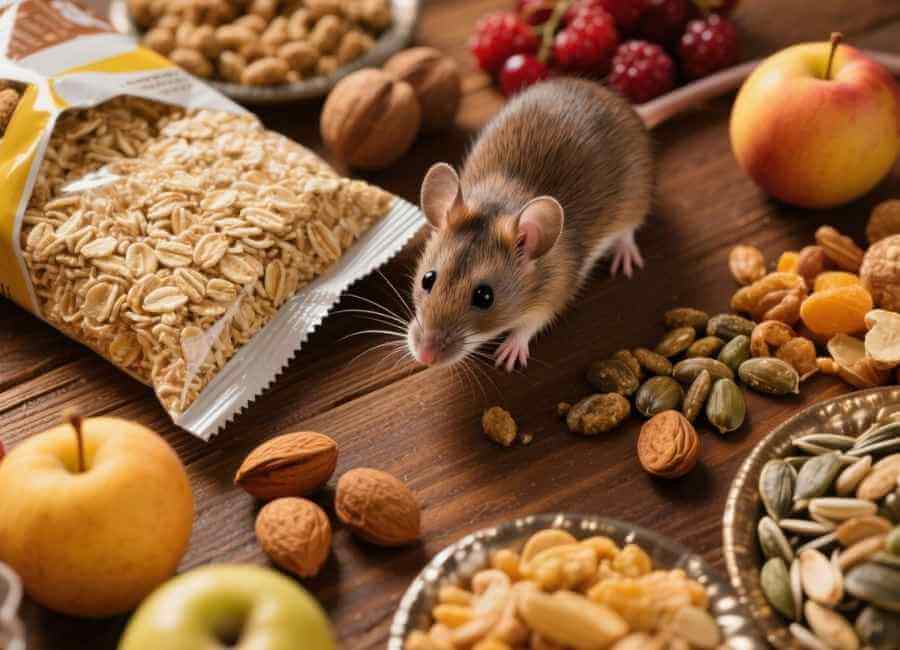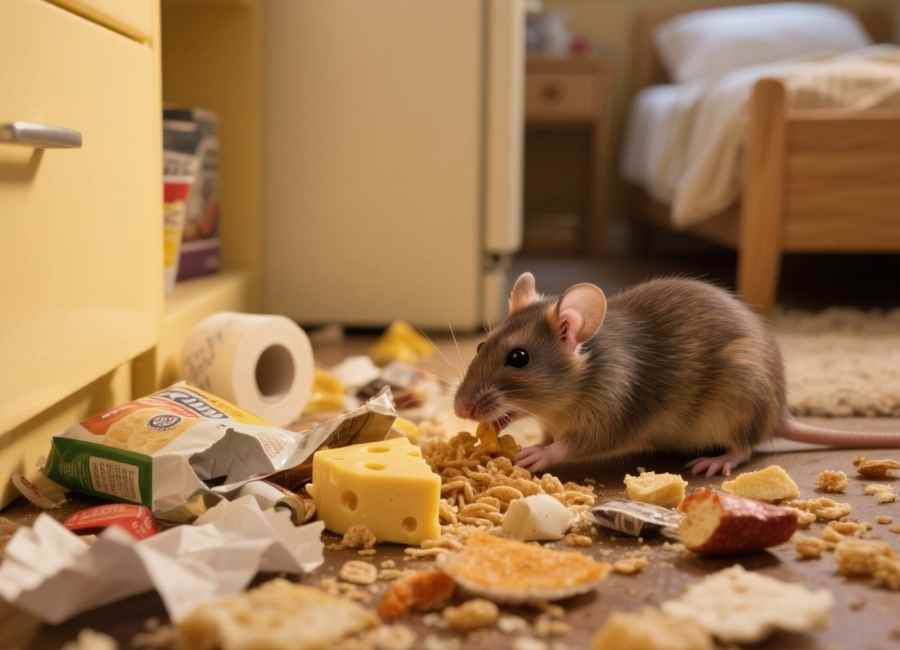Seeing a mouse in your home can be unsettling and raise numerous questions. What are they after? Most importantly, what are they eating? Learning about a mouse’s diet is the first step to controlling an infestation and keeping your home safe from these unwanted visitors.
Many people think of mice as cheese lovers, thanks to cartoons and old stories. While they might nibble on it if it’s available, their valid preferences might surprise you. Knowing what mice actually eat helps you understand why they’ve chosen your Home as their new residence and how to make it less appealing for them.
This guide looks at what house mice like to eat, the unexpected things they’ll eat when food is scarce, and why they chew on things like cardboard and wires. With this information, you can take steps to protect your pantry and keep your home free of mice.
The Diet of a House Mouse
House mice are omnivores, so they eat both plants and animals. (Editors, n.d.) Still, they prefer some foods over others.
Preferred Foods

In the wild or in gardens, mice prefer grains, fruits, and seeds as their primary food sources. They keep these same tastes when they move into your home. Mice are especially attracted to foods high in carbohydrates. (House Mouse Biology, n.d.) That’s why you might find them in your pantry going after things like:
- Cereal and grains
- Oats and other breakfast foods
- Pet food (dog and cat kibble)
- Seeds and nuts
- Fruits and berries
Despite what many people think, cheese is not a mouse’s favourite food. Pest control experts at Orkin say that chocolate is often a better bait than cheddar. Mice like sugary and fatty foods, so things like peanut butter, bacon grease, and candy are especially tempting to them.
What Mice Eat When They’re Desperate

Mice are tough and can survive for a long time with very little food. (Effects of stress due to deprivation and transport in different genotypes of house mouse, 1998, pp. 755-760) When their favourite foods aren’t available, they become less picky and will eat almost anything to stay alive. This can include digging through garbage for scraps and leftovers. (House Mouse / Home and Landscape / UC Statewide IPM Program, 2025)
When food is extremely scarce, mice can exhibit disturbing behaviours. Orkin reports that this can include cannibalism, where a mother eats her young, or a mouse chewing on its own tail. These behaviours are rare and typically occur only when a mouse is under severe stress due to hunger.
Why Do Mice Chew on Everything?
Mice often cause damage by constantly chewing on things that aren’t food. If you’ve seen minor bite marks on cardboard, wires, or wood in your home, you’ve seen this yourself. They do this not just because they’re hungry, but also for nesting and to maintain their dental health.
Nesting Materials

Mice look for dark, quiet, and hard-to-reach places to build their nests. Spots like inside walls, attics, or behind big appliances keep them safe from people and predators. To make their nests warm and cosy, they tear up soft materials they find, such as:
- Cardboard
- Paper and newspaper
- Insulation
- Fabric
They chew these materials into small, soft pieces to make a comfortable nest for themselves and their babies.
Dental Health

A mouse’s front teeth never stop growing. To keep them short and sharp, mice have to chew on hard things all the time. If they didn’t, their teeth would get so long they couldn’t eat. (Rodents and their Ever-Growing Teeth, 2023) That’s why they chew on wood, plastic, and even electrical wires, which can be a serious fire risk in your home. (Rodents: The Fire Hazard You Never Considered, 2025)
Frequently Asked Questions
Do mice really love cheese?
Mice will eat cheese if it’s there, but they usually like foods with more sugar and carbs, such as grains, fruit, or chocolate. Peanut butter often works better than cheese as bait in a trap.
Can mice survive without a constant food source?
Yes, mice are very tough. They can go a long time with little food and will eat almost anything if they get hungry enough, even digging through trash cans. (House Mouse / Home and Landscape / UC Statewide IPM Program, n.d.)
Why are mice chewing on my electrical wires?
Mice chew on complex objects, such as wires, for two main reasons. They use the material for nests, but more importantly, they need to wear down their ever-growing front teeth.
Is it true that mice will eat their own tails?
This is rare and typically only occurs when a mouse is severely starving or highly stressed. It’s not a regular part of their diet.
Protect Your Home from Hungry Mice
Knowing what mice eat is essential for keeping them out of your home. If you store food properly and remove items they can use for nests, your home will be much less attractive to them.
Here are some practical steps you can follow:
- Could you store food in airtight containers? Store items such as cereal, grains, and pet food in sealed plastic or glass containers to prevent contamination and maintain freshness.
- Clean up spills and crumbs. Wipe up food messes right away and sweep the floors to keep your kitchen clean.
- Secure your trash. Use garbage cans with tight lids so mice cannot access food scraps—seal entry points.
If you think you have a mouse problem, it’s usually best to call a professional pest control service. They can determine the extent of the infestation and help you eliminate the mice, preventing them from returning.











